The following information will give you all the details on the vidhis and the procedures to Bring Ganpati Home on the day of Ganesh Chaturthi. A majority of people prefer to bring Bappa home one day prior to the day of Chaturthi. We too, recommend you the same. Please refer to the Muhurut timings with any local Maharaj or on a website, to guide yourself of the appropriate Muhurut time to bring Bappa home and perform the Sthapana.
Be sure to carry the following when you leave to bring Bappa:
- Aggarbatti
- Dhoop
- Aarti Thaali
- Matchbox
- Supari – 1 no.
- Paan Leaf – 1 no.
- Cloth to Cover Murti
Cloth to keep on sandli/ paath*Sandli* (also referred to as chaurang or paath) The Sandli (often made of wood) makes it easier to carry Ganesh Murti.
Performing the vidhis / rituals:
Light the Aggarbatti and dhoop in the Aarti Thaali. Saying ‘Om Gan Ganpatiye Namah’ place the Paan Leaf with a Supari resting on top of it on the floor in front of the Sandli. Also, place some Dakshina for the people who have artistically created the beautiful Murti. Take Lord Ganesha’s name in your mind , and pray for the festival to be a blessed one! If you are bringing Bappa home one day earlier, cover the Murti’s face with a vastra. Only open this on the day of Ganesh Chaturthi during Staphna. Chant the Praise: GANPATI BAPPA MORIYA!
You are ready to leave. Take Bappa Home! – Ganpati Bappa Moriya!
Important :
Leave the paan, supari and dakshina at the place behind, if someone is bringing the Ganesh Murti for you from India, you can handover this supari and dakshina to the person or can also leave this at the store from where you buy the Ganesh Murti.
Do not forget to bring the Aarti Thaali back home with you.
Before entering Home with the Murti, ask a family member to bring a bowl of rice. Shower the rice (kacha rice) on Bappa before bringing Bappa inside. On the day of Chaturthi, Before placing Bappa on his Sthaan, place some kacha rice, on it rest a Supari, Haldi, KumKum, Abhil and Dakshina.
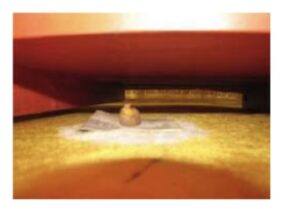
Place Bappa on His Sthaan. You are ready for the Sthapna.
How to Perform Ganesh Staphna
The following information will give you all the details on the vidhis and the procedures for Performing Ganesh Staphma on the day of Ganesh Chaturthi. Before you prepare to Perform the Ganesh Staphna, ensure that you have bought all the items from the Ganesh Chaturthi
Check List for Ganesh Chaturthi
- Suparis (7)
- Paan Leaves (For Kalash) (beetle quid leave) (5)
- Coconuts (3)
- Paint Brush of Big Size to clean Murti daily (1)
- Rice (uncooked/kacha)
- Fresh Flowers
- Red Pooja Dhaga (Raksha Kavach) To tie on wrists after Staphna
- Attar (Perfumed Oil)
- Black Thread (Make Ganesh ji wear before bringing Him home
- Banana Leaves (Kele che khamb)
- Durva, Bhel Patra
- Diya Wicks
- Prasad (Modaks)
- Fresh Fruits
- Plan decoration ahead. You may need Tables, White spreadsheets, plastic sheets
- Floral Ideas (Torans for outside home, table of Ganesh ji, flower mala for Ganesh ji
- Measuring Tape (To keep a record of Murti Size)
- Shringar Samaan
• Mukut - Mala / Maitri
- Hand / Arm Bracelets
- Vastra – For Ganesh ji
- Vastra – To cover Sandli before seating Ganesh ji
- Vastra – To cover Ganeshji while bringing Him home if brought one day before Ganesh Chaturthi
Pooja Samaan
• Haldi, Pinjar, Abhil, Gulal, Ashtaghand, Sindoor, Chandan
• Camphor tablets, Dhoop, Aggarbatti
• Honey
• Khadi-Sakhar
• Cotton
• Akhrot (5), - Badaam (5),
- Khareek (5)
- Jaggery
• Matchbox - Ganga jal
–
–
Ganesh Chaturthi or Vinayaka Chaturthi is one of the most colourful and widely celebrated festivals in India. Large numbers of people observe Ganesha Chaturthi poojas at home. Whereas most people prefer to call pundits home on the day of Ganesh Chaturthi to perform the Ganesh Staphna, the majority of the people also prefer to perform the rituals by them-selves with sampoorna bhavna and prem.
Here is an explanation of how to perform Ganesha pooja and Staphna at home as mentioned in Hindu scriptures.
Ganesha pooja on the Chaturthi day is usually performed as per the Muhurat. The pooja can be led by any one of the family members and others should join in. God worship is enjoyed by everyone. Pooja means the traditional ceremony by which God is worshipped. However, the devotion is the indispensable part of any pooja, by which, even simple gestures and poojas are like sacred rituals. Before entering the shrine room, all the attendees should take bath, dress in clean clothes and bring a small offering of flowers or fruits. Generally, fruits offered are bananas, mangoes, sweet limes, pomegranates and jackfruit.
Firstly,
Prepare the kalash: take a kalash and fill it with clean drinking water, add to the water 1 supari, Rs. 1, 25 paise coins or HK$1.25 coins, haldi and kumkum, some attar (perfume oil), place 5 paan leaves, and finally the coconut. Decorate the coconut and the paan leaves with haldi and kumkum.
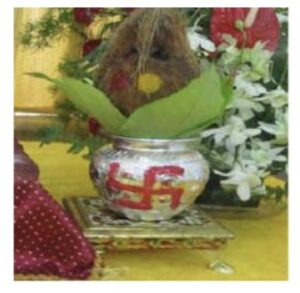 Next, prepare the sthaan where Ganpati will sit. Do that by spreading a handful of kacha rice grains on the place. Over the rice grains, place one supaari and put haldi and kumkum on the supari. Over that place some dakshina. Reciting “Ganpati Bappa Moriya”, we must place the Ganpati Idol over this preparation.
Next, prepare the sthaan where Ganpati will sit. Do that by spreading a handful of kacha rice grains on the place. Over the rice grains, place one supaari and put haldi and kumkum on the supari. Over that place some dakshina. Reciting “Ganpati Bappa Moriya”, we must place the Ganpati Idol over this preparation.
The worship begins with the “Sthapana” (establishment) of the idol. Next step is to invoke Ganesha into the image. This is known as pran-prathishta. The Pran Prathista mantra in Sanskrit to be invoked is found in the Rig Veda and is part of Ganesh Suktha.
Then recite the following mantra:
ganananh tva ganapatim havamahe kavim kavinam upamashravastamam | jyeshhtharajam brahmanan.h brahmanaspata A nah shrivnvannutibhih sida sadanam ||
(Rig Veda 2.23.1)
ni shhu sida ganapate ganeshhu tvamahurvipratamam kavinam | na rite tvat.h kriyate kinchanare mahamarkam maghavan.h chitramarcha || (Rig Veda 10.112.9)
Meaning : We invoke You, O Ganapati of the ganas (Lord Shiva attendants), Who are Brahmana-spati of the brahmas (prayers), the wisest among the wise, Who abound in treasure beyond all measure, the most brilliant one. Do listen to our prayers, come with Your blessings and assurances of protection into our home, and be seated. (Rig Veda 2.23.1)
Sit down among the worshippers, O Ganapati, the best sage among the sages. Without You nothing can be done here or far. Accept with honor, O wealthy One, our great and variegated hymns of praise. (Rig Veda 10.112.9)
Once the Idol has been stapith

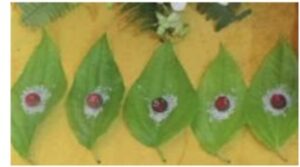
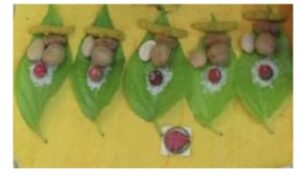
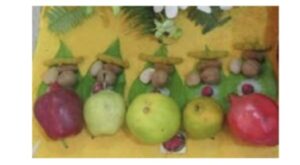
You are now ready for lifting the cover of Ganesh Ji. (If you bring Ganpati home one day prior, we cover him with decorative vastra). You can life the vastra now chanting Ganpati Bappa Moriya.
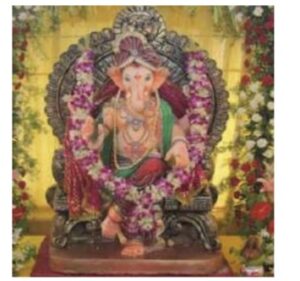
After lifting the vastra, you must remove the black dhaaga. Clean the Murti with a dry paint brush.
PLEASE NOTE: WASHING GOD’S HANDS AND LEGS IS SYMBOLIC. DO NOT ACTUALLY DO THE SAME. SIMILARLY FOR ABHISHEKH WITH MILK, NECTAR, CURD SHOULD NOT BE DONE ON THE MURTI (IDOL).
Offer him the shringar in form of the Mukut, Mala/ Maitri, Bracelets, Vastra For Murti. Put a garland of fresh flowers over Ganpati Bappa.
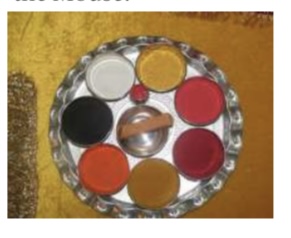
Offer and put on His forehead, haldi, pinjar, abhil, gulal, ashtagandh and sindhoor. Also offer His vahan, undhir mama, the Mouse.
Offer Ganpati Bappa and undhir mama (mouse), the prasad which is His favourite, the Modaks. The recipe for the Modaks can be found here. These can be made at home or can also be bought from out. For people residing out of India, you can find a very easy recipe on our website on the link mentioned above.
Keep a red pooja dhaga next to Ganpati Bappa, this can later be tied
on hands of all family members after the First Aarti.
Once the ‘Pranpratishtha’ is done, then you need to light the lamp and incense sticks to please the ‘God’.
After this you have to perform the ‘ Shhodashopachara ‘, which are 16 forms of paying tribute to Shree Ganesha. (This ritual is usually performed by the priests, you can skip this.)
Here you offer 21 Druva grass blades, 21 Modakas, and Flowers to Ganesha. You need to apply a Tikka of red Sandalwood paste on the forehead of the Deity and keep the coconut along with the idol.
- Offer 21 blades of Druva Grass.
- Offer 21 modaks
- Offer red flowers
- Apply a tilak using red Sandalwood paste.
- Break the coconut or just keep it along with the idol. You can also keep fried grains. (The food of the rat – the vehicle of Ganesha).
The number 21 signifies – the five organs of perception, five organs of action, five vital airs (pranas), five elements, and the mind. Using a Diya wick, make and light the Akhand Jyot (the diya), and the aarti thaali is to be lit which can have the agarbattis, dhoop, (insense and fragrance) and camphor tablets to be lit during Aarti.
The Shahad and khadi shakar should be offered to Ganpati (One can also offer chandan), now Keep the prasad you have prepared in front of Ganesh Ji, sprinkle with ganga jal You can also recite the 108 salutations dedicated to Lord Ganesha or read the Ganesha Upanishad or just simply pray.
You are ready for the Aarti! You can sing Jai Ganesh
Jai Ganesh and Sukh Karta Dukh Harta.
After the Aarti, the family members should gather in front of Ganesh Ji, keep a coconut next to Him and say, “Dear Ganesh Ji, we welcome you to our home. In our offer of prayers, in case we have committed any mistakes, knowingly or unknowingly, kindly forgive us. We pray on behalf of all of us to make this Chaturthi a blessed one. Keep us all happy and healthy always”. You are welcome to add your prayers here. PLEASE NOTE: It is essential to ask for forgiveness at this time while placing the coconut. On the day of the visarjan, this coconut should also be immersed in the water. You can also tape-record this entire Staphna for your memory with the Mini DV cassettes.
Thereafter, all of the family members bow down to Ganesha and ask for God’s blessings to fulfill all their desire. While performing Ganesha Pooja at home, you can always be flexible. The strict rituals are meant for Vedic priests. All you need to be careful is to perform the pujas with a clean body and clean mind. What is more important is devotion not the ritual.
Try to be simple. Concentrate on your prayers not on decoration and other ritualistic details.
How to Perform Ganesh Visarjan
These are some of the common doubts that many devotees have; the concept of Ganesh Chaturthi is that Ganesha comes to the home of his devotees on Ganesh Chaturthi day. He brings auspiciousness, hope, success and happiness to all homes. His brief stay, He removes all obstacles. While returning He takes with him all problems and unhappiness.
Ganesh Visarjan Mantras:
There are no specific Ganesh Visarjan mantras. The only chant that is done is Ganapati Bappa Moriya… You can also chant this prayer :
- Mushikavaahana modaka hastha,
- Chaamara karna vilambitha sutra,
- Vaamana rupa maheshwara putra,
- Vighna vinaayaka paada namasthe
–
Meaning: O Vinayaka! The remover of all obstacles, the son of Lord Shiva, with a form which is very short, with a mouse as Thy vehicle, with sweet pudding in hand, with wide ears and long hanging trunk, I prostrate at Thy lotus-like Feet!
Ganesh Visarjan Procedure:
Before taking Ganesh for Visarjan. You should perform Aarti. All the family members should be present. Usual Ganesh Mantras and Aarti prayers should be changed.
On the day of Visarjan, the day should start with the Pooja (Morning Aarti). We sing the Jai Ganesh Deva and Sukhkarta Dukhharta Aartis. After the Aarti, it is preferred to put ‘Bhog’ the Holy Prasad! which should be distributed among all the family members.
The visarjan ritual begins with the Uttarang puja which involves offering five items, namely deep (oil lamps), pushp (flowers), dhoop (incense), gandh (fragrance) and naivedya (food) to Ganpati.
When it is time for Visarjan, the family members should gather once again and perform the Visarjan Aarti before leaving the house. (the same aartis as mentioned above). After the Visarjan Aarti and distributing the prasad, one of the family members should very slowly and slightly move the Ganpati Murti, about 1 inch forward. This should be done just before leaving the house abt 5-10 mins before. This is an indication/significance to Him that the family is going to take Him for Visarjan.
You should thank Ganesha for visiting your home. Thank him for bringing prosperity and auspiciousness. Thank him for taking away all difficulties with him. Ask for his pardon for any mistakes committed. If you plan to bring Ganesh murti next year, then ask him to return by saying ‘Ganpati Bappa Mourya Pudhchya Varshi Lavkar Ya or can just make a prayer in any language that ‘Hey God Ganesh please come to our house next year’ After this, all members of the household gather to sprinkle akshat or raw rice upon the lord. Now a spoonful of curd is poured into Ganesh’s outstretched palm because Hindus especially Maharashtrians believe that any guest who receives curd and rice is sure to visit again.
Take a red cloth, put sukha nariyal (half), stuff it with jaggery and 5 different grains, tie it in a knot and tie this around Ganesh ji’s hand. This is the food prepared for His journey. Ask for His blessings. The family then circumambulates Ganesha murti after which it is led for immersion.
Take some water and sprinkle it on the person performing the Visarjan or you can visit any nearby pond, lake, river or sea to immerse the Ganesh statue. Remember if you are immersing the statue in water and won’t be taking it back, dip and remove the Murti 3 times before letting it going inside in the third dip.
Article compiled together by Gaurav Pardeshi
Information published from Ganeshchaturthi.com with due permission from the website administrator.
Visit ganeshchaturthi.com for more information and online purchases of
Ganpati Bappa Celebration procedures, mantras, audio cd’s and other materials.
Contact Info.: 5 Prabhat Kunj, 24th Road, Khar West, Mumbai, India. Ph: +91 9821151915, harsh@ganeshchaturthi.com





